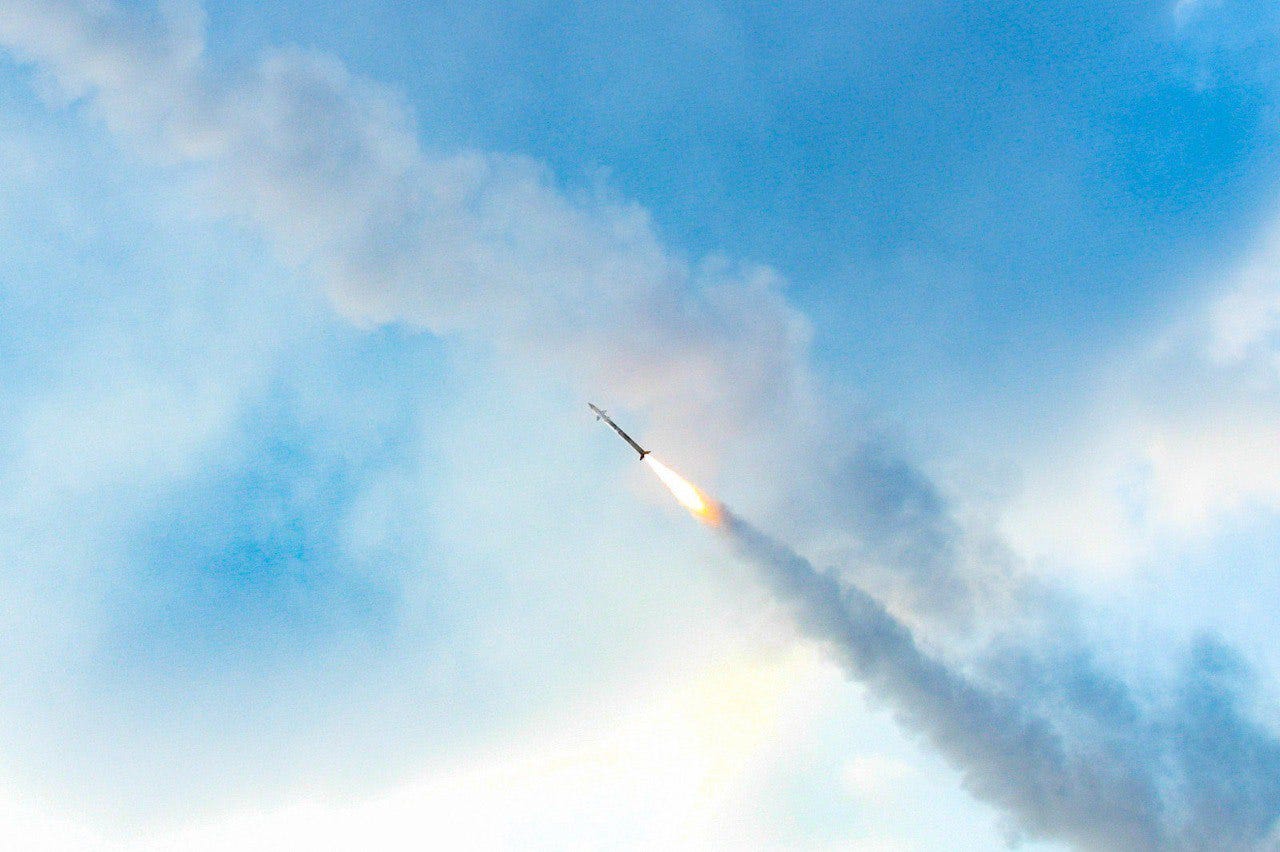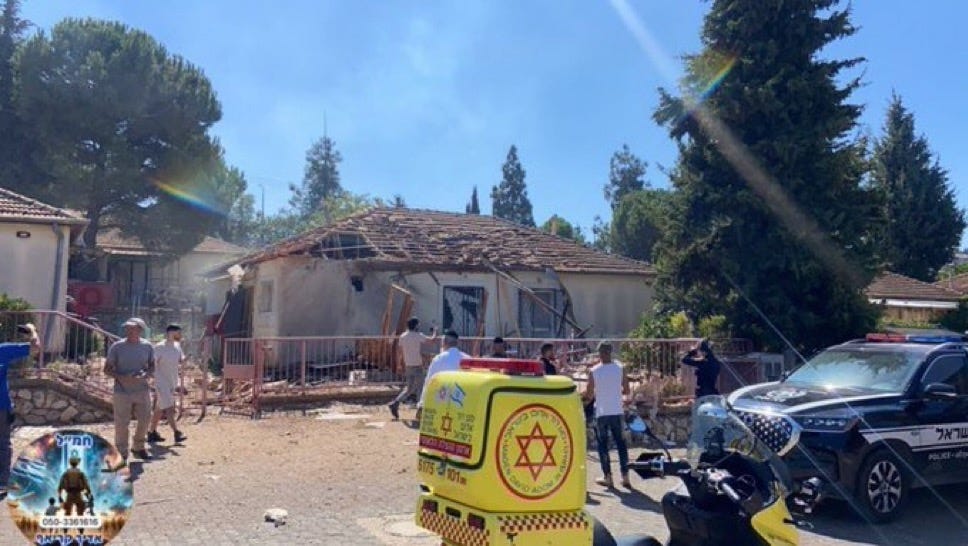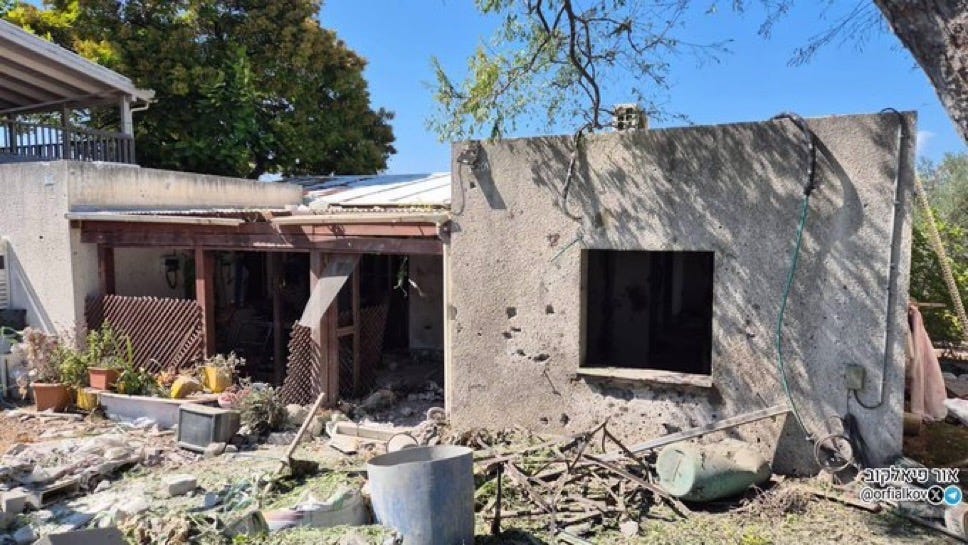DAY 355 OF THE WAR: Hezbollah Fires Missile at Tel Aviv, Israel Continues to Pound Hezbollah Sites in Lebanon, Ground Attack Imminent? Ceasefire Attempts Begin, Independence of Courts
Tel Aviv Diary, September 25, 2024
The inevitable finally occurred this morning at 6:30 AM. The air raid sirens jolted me awake, their sound piercing through the noise of the air conditioner in my closed room. 6:30 AM! The same time the October 7th assault had begun. I quickly got dressed. Our dog Milo began vigorously barking at the sudden movement, but I still managed to get his harness on him. Together with my son and Milo, we rushed down the stairs to the building entrance and then further down to the bomb shelter. The family living on the ground floor was already there, along with other neighbors. Within 60 seconds, everyone from our building, along with some people who were likely passing by, had crowded into the shelter.
Moments after we gathered, we heard the distant sound of an interceptor meeting its target. We soon returned to our apartments, but going back to sleep wasn’t an option. Milo, confused by the disruption of our usual morning routine, was restless. So, I finished getting dressed and took him out for our daily morning walk. The streets were unusually empty for that early hour, and as always, our route passed through Hostage Square, with its poignant reminders of those still held captive—a reality too easily forgotten.
Later, we learned that a ballistic missile carrying a 500kg warhead had been fired at Tel Aviv, apparently targeting the Mossad headquarters just north of the city. Israel’s “David’s Sling” defense system intercepted the rocket high in the atmosphere. Due to the altitude of the interception, air raid sirens sounded across a large area of Tel Aviv to warn residents of potential falling debris. Fortunately, the interception was successful, but the day had already been disrupted
.
By lunchtime, I noticed a change around the neighborhood. The usually bustling streets of Tel Aviv were quiet, and the normally full restaurants were empty. My favorite barista confirmed —hardly anyone had ventured out all day, a stark reminder of how swiftly life can change under the shadow of conflict. For the first time since Hamas stopped firing on the center of the country, Tel Avivians once again felt an ounce of the stress and trepidation that residents of the North have been experiencing for more than 11 months.
Of course the missile fired on Tel Aviv was just the first attack of the day. Shortly thereafter, a drone from Iraq entered the Golan and was shot down. About an hour later, around 9 AM, a barrage of rockets targeted the area of Zichron Ya’akov; thankfully, there was no damage or casualties. Then at 10 AM, another drone originating from Iraq was downed over the Kinneret.
At 11AM, Safed was subjected to a major barrage involving 40 rockets. One rocket struck a house in a retirement community there. The old house, which lacked a safe room due to its age, sustained a direct hit. Luckily, the couple who lived there were traveling overseas at the time
.
At 1 PM, a barrage of rockets targeted the Western Galilee, including Nahariya and areas to the North. One rocket landed on a house in Kibbutz Sa’ar that, which was under renovation. Sadly, three workers, unable to reach a shelter in time, were wounded. In total, 120 rockets were fired at Israel today.
Tonight, two drones were fired from Iraq at Eilat. One was downed by the Naval version Iron Dome, the second exploded in the port area, causing minor injury to one man.
Today marked the third day of significant attacks on Lebanon; as of this evening, the Air Force reported hitting 2,000 targets in Lebanon. On the first day alone, 1,000 targets—half of the total over the three days—had been struck. It is important to note that the Air Force was operating from a target list prepared over a ten-year period. Some commentators suggest that the Air Force has eased its efforts with the reduction in attacks, but in reality, locating targets becomes more challenging after the initial and second waves of attacks.
NOA KIREL POSTPONES CONCERT
Israeli pop-star, phenom, Noa Kirel had planned a large concert in Yarkon Park for tomorrow night. As of last night, Kirel was determined to proceed with the concert. However, following this morning’s missile attack on Tel Aviv, Kirel announced that the concert would be postponed until the middle of next month.
IDF STATEMENT REGARDING THE NORTH
The IDF spokesman issued a statement from the Commander of the Northern Front, indicating that we are at a pivotal juncture and nearing a ground invasion of Lebanon. Additionally, the IDF announced the activation of two brigades of reservists to serve on the northern front.
Today, the IDF Chief of Staff addressed the troops, and his remarks were made public as part of the campaign to demonstrate our readiness to enter Lebanon:
You hear the planes up there; we're attacking all day. Both to prepare the area for the possibility of your entry, and to continue hitting Hezbollah. Hezbollah expanded its circle of fire today, and later in the day, it will receive a very strong response. You should prepare.
Today we'll continue, we're not stopping, we continue to attack and continue to hit them everywhere. The goal is a very clear goal to bring back the residents of the north safely.
To do this, we are preparing the maneuver, and the meaning is that your military shoes, your maneuver boots, enter enemy territory, enter a village that Hezbollah has prepared as a large military outpost, with underground facilities, with staying points, with launching points to jump into our territory and carry out an attack on Israeli civilians.
Your entry there with force, the encounter with Hezbollah operatives there, who will see what it means to meet a professional, very skilled fighting force with combat experience. You come much stronger than them, much more experienced than them, entering inside, destroying the enemy there, going decisively to destroy infrastructure. These are the things that will allow us to bring back the residents of the north safely afterwards.
It should be noted that the Security Cabinet will meet tonight and grant the Prime Minister and Defense Minister the authority to launch a ground invasion into Lebanon. These actions are designed to pressure Nasrallah into accepting an agreement on our terms.
ANTHONY BLINKEN ON THE TODAY SHOW
I thought it would be worthwhile to include Secretary of State Blinken's interview with Savannah Guthrie on NBC’s Today show this morning:
QUESTION: And joining us now, Secretary of State Antony Blinken. Mr. Secretary, good morning to you.
SECRETARY BLINKEN: Good morning.
QUESTION: Let’s start right there. Donald Trump says he was briefed by intelligence officials about Iran’s efforts to assassinate him. The ODNI has confirmed this. U.S. officials have. How concerned are you about this threat? And will there and should there be consequences against Iran
SECRETARY BLINKEN: Look, this is something we’ve been tracking very intensely for a long time – an ongoing threat by Iran against a number of senior officials, including former government officials like President Trump, and some people who are currently serving the administration. So it’s something we take very, very seriously. We’re looking at it very carefully. I don’t have any further information to share, but know that we’re watching this very carefully.
QUESTION: Let’s talk about what’s going on right now in the Middle East – as you well know, a massive bombardment by Israel into the north into Hezbollah territory. The Israeli theory here is escalate to de-escalate; in fact, just in essence, hit Hezbollah so hard they’re forced to the negotiating table. Put simply, does the U.S. support this escalation strategy by Israel?
SECRETARY BLINKEN: Well first, Israel has a real and legitimate problem, because here’s what happened. After the horrific events of October 7th by Hamas in Israel in the south, Hezbollah from Lebanon joined in and started firing rockets into Israel. People who lived in northern Israel had to evacuate their homes. Villages were destroyed. Homes were destroyed. Seventy thousand Israelis were forced from their homes.
And Israel started firing back. You had a tit-for-tat going back and forth. People in southern Lebanon had to leave their homes too. And what everyone wants is to have a secure environment in which people can simply return home, kids can go back to school. That’s what Israel is after.
So the best way to get that is not through war, not through escalation. It would be through a diplomatic agreement that has forces pulled back from the border, create a secure environment, people return home. That’s what we’re driving toward. Because while there’s a very legitimate issue here, we don’t think that war is the solution.
QUESTION: Well fair enough, but Israel is not listening to that. In fact, the U.S. Defense Secretary on Sunday told his Israeli counterpart to give time for diplomacy to work. And on Monday, this Israeli bombardment was the most serious, deadliest day in Lebanon since 2006.
SECRETARY BLINKEN: Yeah, what —
QUESTION: But Israel is not listening to the U.S. Why not?
SECRETARY BLINKEN: What we’re focused on now, including with many partners here in New York at the UN General Assembly, the Arab world, Europeans and others, is a plan to de-escalate and, again, to make sure that people can go back to their homes. But if there were to be a full-scale war – which we don’t have and which we’re working to avoid – that’s actually not going to solve the problem. It’s unlikely that people would be able to return home if there’s a full-scale war going on.
QUESTION: Short answer: Does the U.S. support what Israel is doing right now in terms of this escalation in order to later de-escalate and get to the negotiating table?
SECRETARY BLINKEN: What we support is solving the problem of making sure that people can go home. But we believe the best way to solve it is through diplomacy, not through war.
QUESTION: Why does the U.S. not have or use more leverage over Israel, its ally? We are the supplier of the bulk of its weapons of war, and yet there are countless examples – and you probably know them better than I – where Israel seems to flout what the U.S. is asking or suggesting. Why is that?
SECRETARY BLINKEN: Look, we have a longstanding relationship and security relationship with Israel, including making sure that it has what it needs to prevent the many enemies that it has from attacking it, to deter them. And that’s important to avoiding war as well.
And in this instance, there is a real problem that needs to be solved. Again, from our perspective, the best way to do it is diplomatically. We’re engaged with Israel on that. We’re engaged with others in the region on that. And we need to, I think, find the opportunity now to stop any escalation, prevent a full-scale war, get people back to their homes.
QUESTION: Should the U.S. have been given a heads-up, for example, that Israel was going to assassinate a political leader in Iran, in Tehran, or this pagers attack of last week? Shouldn’t the U.S., its Israeli ally, have gotten a heads-up at that a minimum?
SECRETARY BLINKEN: Look, it’s always nice not to be surprised by the action that someone takes. Certainly that’s better. But since October 7th, besides trying to make sure that October 7th never happens again, besides trying to sure that civilians in Gaza – men, women, and children who are caught in this horrific crossfire of Hamas’s making – are better protected and get the assistance they need.
We’re – we’ve also been working to prevent this war from spreading, from escalating, from going to other places. That’s what we’re focused on now – making sure that what you’re seeing in northern Israel, southern Lebanon now, doesn’t become a full-scale war, and on the contrary, that we resolve the problem that Israel has.
QUESTION: Can I ask about that pagers attack where Hezbollah members were the targets and their – literally in their hands their pagers exploded. Some see this as a technological coup and an ingenious move by Israel. Others, including John Brennan, former Defense Secretary Leon Panetta, who you know well, saying it’s a form of terrorism and it went too far. Where do you come down on it?
SECRETARY BLINKEN: Look, we’ve got to start with the proposition that Hezbollah is a terrorist organization.
QUESTION: No question.
SECRETARY BLINKEN: So designated by the United States. And the reality is Israel left southern Lebanon. It had been occupying southern Lebanon for 15 years. It left in 2000. And all of these militia that existed there were supposed to put down their weapons. Hezbollah didn’t do it. And then repeatedly in the time after that, it attacked and posed a threat to people living in northern Israel. So it’s very legitimate that Israel do something about Hezbollah. We’d like —
QUESTION: No question about it.
SECRETARY BLINKEN: The only question is: What’s the best way to do it?
QUESTION: Oh, and the tactics.
SECRETARY BLINKEN: And what are the best tactics? And those are things that we’re always discussing with them. But right now, our main challenge is preventing a broader war, one that actually won’t solve the challenge that Israel has, and by the way the Lebanese have because they want to get their people back to their homes in southern Lebanon too. We want that too.
QUESTION: In fairness, you didn’t answer whether or not you approved of this particular tactic.
SECRETARY BLINKEN: Look, you’re always looking at what someone is doing, trying to figure out what the second- or third-order consequences may be. Does it open up a whole new Pandora’s box? It is something we’re looking at.
QUESTION: Both sides, as far as the ceasefire in Gaza, do not seem very interested in a deal. It seems like the U.S. is working quite hard at it, and you have Netanyahu moving the goal posts late in the negotiations in some case, you have the Hamas leader who’s also doing the very same thing. And it goes without saying it is Hamas that broke the ceasefire that existed on October 6th.
SECRETARY BLINKEN: Right.
QUESTION: Let’s not forget that. You had said in mid August that there was – this was sort of maybe the last best chance, you said, for the deal. So in that same spirit of candor, what is the likelihood of a ceasefire deal right now.
SECRETARY BLINKEN: We have a piece of paper, an agreement. It’s got 18 paragraphs. Fifteen of those paragraphs have been agreed between Hamas and Israel. But what’s happened over the last few weeks is Hamas has simply not been at the table, not been willing to engage on the remaining outstanding issues that, if we close them, will close the deal, will get it over the finish line. Now, Israel would have some hard decisions to make in the very end game too, so we have to look to that.
QUESTION: Well, let’s just say the quiet part out loud. President Biden is a lame duck President. He’s not running again. Do you think that Netanyahu, Sinwar, other world leaders, are biding their time just running out the clock hoping they’ll fare better in a new administration, potentially one of Donald Trump?
SECRETARY BLINKEN: Look, I can’t put myself in the minds of other leaders, other partners. I can tell you though that with the end of a term, with the end of an administration – and I’ve been through a few of them in the past – there’s also a certain amount of freedom because – and especially for President Biden, who has been doing this for so long and so well. He knows what he wants to get accomplished. He is determined to use the months that he has left as President to run through the tape.
QUESTION: So your message to anyone who perceives weakness or indecision —
SECRETARY BLINKEN: Our message, my message to anyone who perceives weakness, is President Biden is here till January 20th. He’s going to use every single day to advance the national interest.
QUESTION: Secretary of State Tony Blinken, thank you so much for your time.
SECRETARY BLINKEN: Great to be with you.
CEASEFIRE ATTEMPTS
Currently, the U.S. and France are working to persuade Hezbollah to accept the agreement that it has rejected until now, which involves returning to UN Resolution 1701 (accepted by the UN Security Council at the end of the 2006 Lebanon War) and which calls for withdrawal of Hezbollah forces beyond the Litani River.
Given Nasrallah's losses over the past three days and the looming threat of a ground invasion, there is hope for progress. At the moment, the French and the Americans are attempting to broker a four-week ceasefire between Nasrallah and Israel, during which they aim to negotiate a long-term deal. Israel has indicated that this is a nonstarter and is willing to negotiate a long term ceasefire while fighting continues. It makes no sense for Israel to give Hezbollah time to rearm during a temporary ceasefire.
NETANYAHU TO UN
Prime Minister Netanyahu will be flying to New York to deliver a speech at the UN on Friday. Originally scheduled for Thursday, Netanyahu’s remarks were magically
Keep reading with a 7-day free trial
Subscribe to Tel Aviv Diary to keep reading this post and get 7 days of free access to the full post archives.





